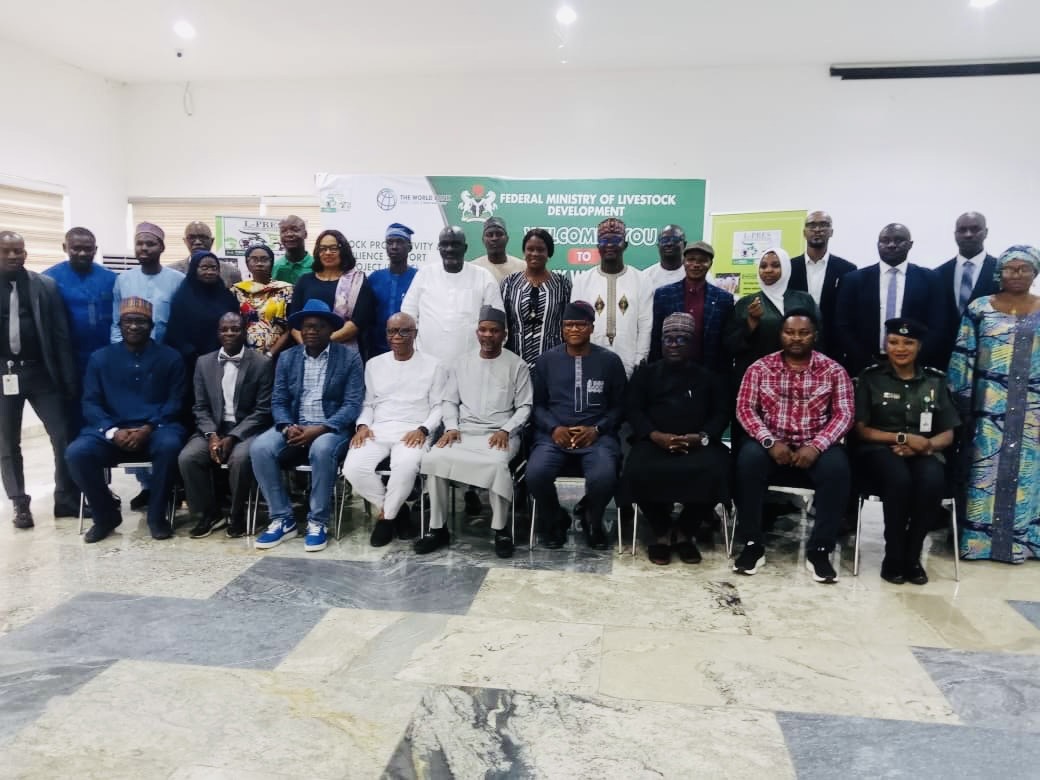L-PRES, partners push for livestock regulation reforms
By Felicia Imohimi
The Livestock Productivity and Resilience Support Project (L-PRES), in collaboration with key stakeholders, has intensified efforts to establish an effective regulatory and incentive framework for sustainable livestock development in Nigeria.
Dr Sanusi Abubakar, National Project Coordinator (NPC) of L-PRES, said this at a two-day workshop titled “Enhancing Regulation and Incentive Frameworks for the Livestock Value Chain in Nigeria,” in Abuja on Tuesday.
Abubakar said the workshop aimed to develop an acceptable framework for all stakeholders, including farmers.
He emphasised the importance of co-creating a clear roadmap for sustainable, inclusive, and competitive livestock development, and building consensus on enforcement, monitoring, rewards, and sanctions.
The News Agency of Nigeria (NAN) reports that the workshop also reviewed a report titled “Consultancy Award – Understanding of Studies to Improve Selected Livestock Value Chains Regulatory and Incentive Frameworks for L-PRES Projects.”
Abubakar noted that L-PRES had conducted a comprehensive study to assess the existing regulatory and incentive frameworks in light of the challenges facing the sector.
“The findings revealed that while there are numerous opportunities, the sector cannot reach its full potential without deliberate reforms that balance regulation, ensuring food safety, sustainability, and fairness, with incentives that stimulate compliance, innovation, and investment.”
He identified the livestock sector as a cornerstone of Nigeria’s food security, employment, and rural livelihoods.
However, he highlighted challenges such as, weak value chain organization, poor enforcement of existing regulations, inadequate compliance with good animal husbandry practices and limited incentives to drive innovation
“These structural bottlenecks have constrained productivity, market access, and competitiveness, both within and beyond our borders,” Abubakar said.
He emphasised that a well-structured regulatory framework should define clear boundaries of engagement for all value chain actors, ensuring food safety, environmental sustainability, fair competition, and consumer protection.
Calling on stakeholders to collaborate, Abubakar said: “Nigeria stands at a critical juncture.
“With the right mix of regulatory clarity, incentive alignment, and stakeholder collaboration, our livestock sector can become a driver of national development.”
Stakeholders at the workshop
He added that with sustained efforts, the sector had the potential to become a strong competitor in global markets.
He added that incentive mechanisms such as subsidies, tax breaks, certifications, and carbon credit schemes were essential to encourage innovation, sustainability, and best practices.
These, he said, must be properly aligned, enforced, and regularly reviewed to drive sector transformation.
Prof. Maikano Ari, Deputy Vice Chancellor (Academics), Nasarawa State University, gave an overview of the report.
He explained that the consultancy initiative was designed to enhance the regulatory and incentive framework for selected livestock value chains.
Ari said the initiative aimed to integrate: Standard Operating Procedures (SOPs), Minimum Operating Procedures (MOPs), Global best practices, and Biosecurity measures.
He identified weaknesses in the current framework, including lack of legal backing, underfunded enforcement agencies, limited manpower, corruption, absence of SOPs, and weak compliance monitoring.
He said proposed interventions include the development of Standard Operating Procedures (SOPs) and Minimum Operating Procedures (MOPs), as well as the adoption of global best practices.
“Other measures include the implementation of a reward and sanction system and the synchronisation of regulatory bodies.
“Additional interventions involve strengthening enforcement mechanisms, building the capacity of both regulators and farmers, and ensuring direct incentive delivery to genuine farmers.”
Stakeholders at the workshop included representatives from the Ministry of Livestock Development, Nigerian Institute of Animal Science (NIAS), Nigeria Agricultural Quarantine Services (NAQS), and the Veterinary Council of Nigeria (VCN).
Also present were officials from the Standard Organisation of Nigeria and the National Agency for Food and Drug Administration and Control (NAFDAC).
Other participants included the National Environmental Standards and Regulations Enforcement Agency (NESREA), state ministries of agriculture, development partners, as well as farmer and herder associations, among others. (NAN)
Edited by Dorcas Jonah/Abiemwense Moru
Published By
- Agriculture and Environment Desk Controller/Website Content Manager.
Has also recently published
 ReligiousSeptember 11, 2025Gospel singer Lily Perez thrills worshippers at COZA
ReligiousSeptember 11, 2025Gospel singer Lily Perez thrills worshippers at COZA HealthSeptember 11, 2025FG distributes N23bn medical equipment, essential drugs
HealthSeptember 11, 2025FG distributes N23bn medical equipment, essential drugs HealthSeptember 11, 2025ASWHAN advocates access to essential HIV services for underserved groups
HealthSeptember 11, 2025ASWHAN advocates access to essential HIV services for underserved groups Economy/BusinessSeptember 10, 2025Tinubu wants bankers, stakeholders to embrace reforms to build inclusive, accountable institutions
Economy/BusinessSeptember 10, 2025Tinubu wants bankers, stakeholders to embrace reforms to build inclusive, accountable institutions




